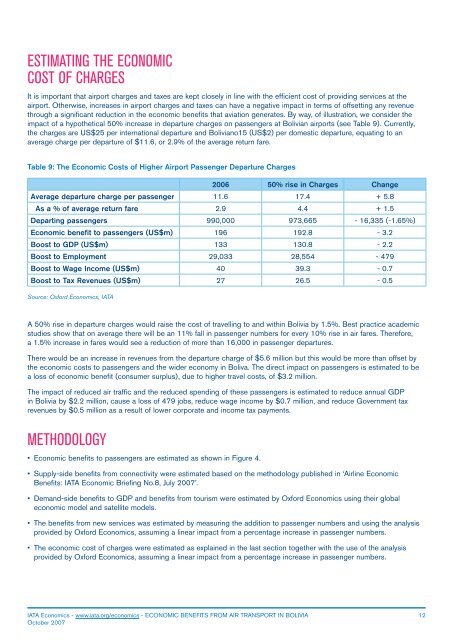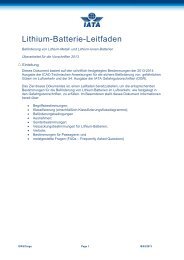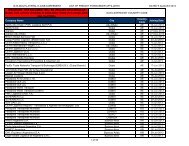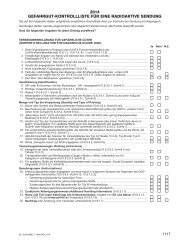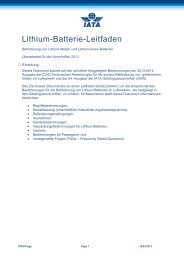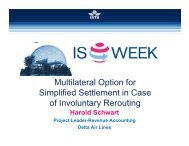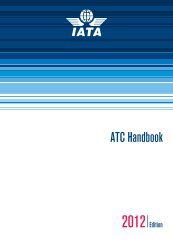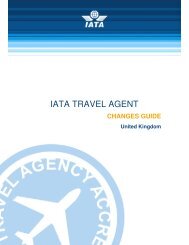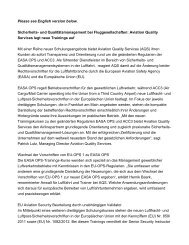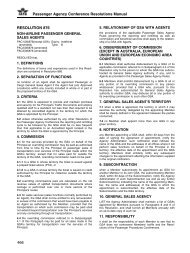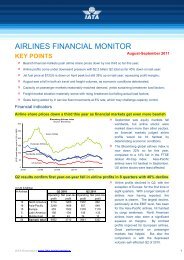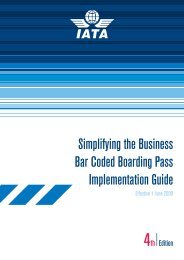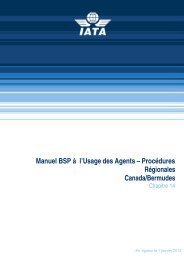ECONOMIC BENEFITS FROM AIR TRANSPORT IN BOLIVIA - IATA
ECONOMIC BENEFITS FROM AIR TRANSPORT IN BOLIVIA - IATA
ECONOMIC BENEFITS FROM AIR TRANSPORT IN BOLIVIA - IATA
Create successful ePaper yourself
Turn your PDF publications into a flip-book with our unique Google optimized e-Paper software.
ESTIMAT<strong>IN</strong>G THE <strong>ECONOMIC</strong><br />
COST OF CHARGES<br />
It is important that airport charges and taxes are kept closely in line with the efficient cost of providing services at the<br />
airport. Otherwise, increases in airport charges and taxes can have a negative impact in terms of offsetting any revenue<br />
through a significant reduction in the economic benefits that aviation generates. By way, of illustration, we consider the<br />
impact of a hypothetical 50% increase in departure charges on passengers at Bolivian airports (see Table 9). Currently,<br />
the charges are US$25 per international departure and Boliviano15 (US$2) per domestic departure, equating to an<br />
average charge per departure of $11.6, or 2.9% of the average return fare.<br />
Table 9: The Economic Costs of Higher Airport Passenger Departure Charges<br />
2006 50% rise in Charges Change<br />
Average departure charge per passenger 11.6 17.4 + 5.8<br />
As a % of average return fare 2.9 4.4 + 1.5<br />
Departing passengers 990,000 973,665 - 16,335 (-1.65%)<br />
Economic benefit to passengers (US$m) 196 192.8 - 3.2<br />
Boost to GDP (US$m) 133 130.8 - 2.2<br />
Boost to Employment 29,033 28,554 - 479<br />
Boost to Wage Income (US$m) 40 39.3 - 0.7<br />
Boost to Tax Revenues (US$m) 27 26.5 - 0.5<br />
Source: Oxford Economics, <strong>IATA</strong><br />
A 50% rise in departure charges would raise the cost of travelling to and within Bolivia by 1.5%. Best practice academic<br />
studies show that on average there will be an 11% fall in passenger numbers for every 10% rise in air fares. Therefore,<br />
a 1.5% increase in fares would see a reduction of more than 16,000 in passenger departures.<br />
There would be an increase in revenues from the departure charge of $5.6 million but this would be more than offset by<br />
the economic costs to passengers and the wider economy in Boliva. The direct impact on passengers is estimated to be<br />
a loss of economic benefit (consumer surplus), due to higher travel costs, of $3.2 million.<br />
The impact of reduced air traffic and the reduced spending of these passengers is estimated to reduce annual GDP<br />
in Bolivia by $2.2 million, cause a loss of 479 jobs, reduce wage income by $0.7 million, and reduce Government tax<br />
revenues by $0.5 million as a result of lower corporate and income tax payments.<br />
METHODOLOGY<br />
• Economic benefits to passengers are estimated as shown in Figure 4.<br />
• Supply-side benefits from connectivity were estimated based on the methodology published in ‘Airline Economic<br />
Benefits: <strong>IATA</strong> Economic Briefing No.8, July 2007’.<br />
• Demand-side benefits to GDP and benefits from tourism were estimated by Oxford Economics using their global<br />
economic model and satellite models.<br />
• The benefits from new services was estimated by measuring the addition to passenger numbers and using the analysis<br />
provided by Oxford Economics, assuming a linear impact from a percentage increase in passenger numbers.<br />
• The economic cost of charges were estimated as explained in the last section together with the use of the analysis<br />
provided by Oxford Economics, assuming a linear impact from a percentage increase in passenger numbers.<br />
<strong>IATA</strong> Economics - www.iata.org/economics - <strong>ECONOMIC</strong> <strong>BENEFITS</strong> <strong>FROM</strong> <strong>AIR</strong> <strong>TRANSPORT</strong> <strong>IN</strong> <strong>BOLIVIA</strong><br />
October 2007<br />
12


